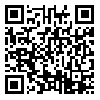Volume 9, Issue 2 (summer 2022)
DSME 2022, 9(2): 61-72 |
Back to browse issues page
Research code: این مقاله برگرفته از پایان نامه کارشناسی ارشد می باشد.
Ethics code: این مقاله برگرفته از پایان¬نامه کارشناسی ارشد برنامه ر
PhD, Educational Sciences, Department of Educational Sciences, Payam Noor University, Tehran, Iran
Abstract: (669 Views)
Introduction: The purpose of this study was to qualitatively analyze the implemented methods of academic evaluation as one of the challenging aspects of e-learning and to investigate its effect on academic self-efficacy of second grade elementary students.
Methods: The present study was performed with mixed method methodology and qualitative-quantitative approach. The statistical population in the qualitative section included second-year elementary teachers of Chaharmahal Bakhtiari State; In the quantitative phase, there were 458 second-year students in the elementary schools of Sureshjan city. The sampling method in the qualitative phase was purposive and the sample size with theoretical saturation was determined as 15. In the quantitative phase, cluster sampling method was applied and 210 people were selected. The data collection tool were semi-structured interviews and Scherer questionnaire. The themes were analyzed through step-by-step analysis of variance using SPSS 23 software.
Results: The findings indicated that the methods of evaluation in electronic and traditional education were different from eight dimensions. The methods were implemented in two groups including: The process-oriented and the result-oriented. The highest average score of academic self-efficacy was obtained from the evaluation method based on participation and the lowest was obtained from the objective evaluation method.
Conclusion: Based on the findings, applying multiple assessment and process-oriented methods could best increase academic self-efficacy in the second-year elementary students.
Methods: The present study was performed with mixed method methodology and qualitative-quantitative approach. The statistical population in the qualitative section included second-year elementary teachers of Chaharmahal Bakhtiari State; In the quantitative phase, there were 458 second-year students in the elementary schools of Sureshjan city. The sampling method in the qualitative phase was purposive and the sample size with theoretical saturation was determined as 15. In the quantitative phase, cluster sampling method was applied and 210 people were selected. The data collection tool were semi-structured interviews and Scherer questionnaire. The themes were analyzed through step-by-step analysis of variance using SPSS 23 software.
Results: The findings indicated that the methods of evaluation in electronic and traditional education were different from eight dimensions. The methods were implemented in two groups including: The process-oriented and the result-oriented. The highest average score of academic self-efficacy was obtained from the evaluation method based on participation and the lowest was obtained from the objective evaluation method.
Conclusion: Based on the findings, applying multiple assessment and process-oriented methods could best increase academic self-efficacy in the second-year elementary students.
Type of Study: Orginal |
Subject:
Special
Received: 2022/08/18 | Accepted: 2022/11/30 | Published: 2022/12/31
Received: 2022/08/18 | Accepted: 2022/11/30 | Published: 2022/12/31
| Rights and permissions | |
 |
This work is licensed under a Creative Commons Attribution-NonCommercial 4.0 International License. |



